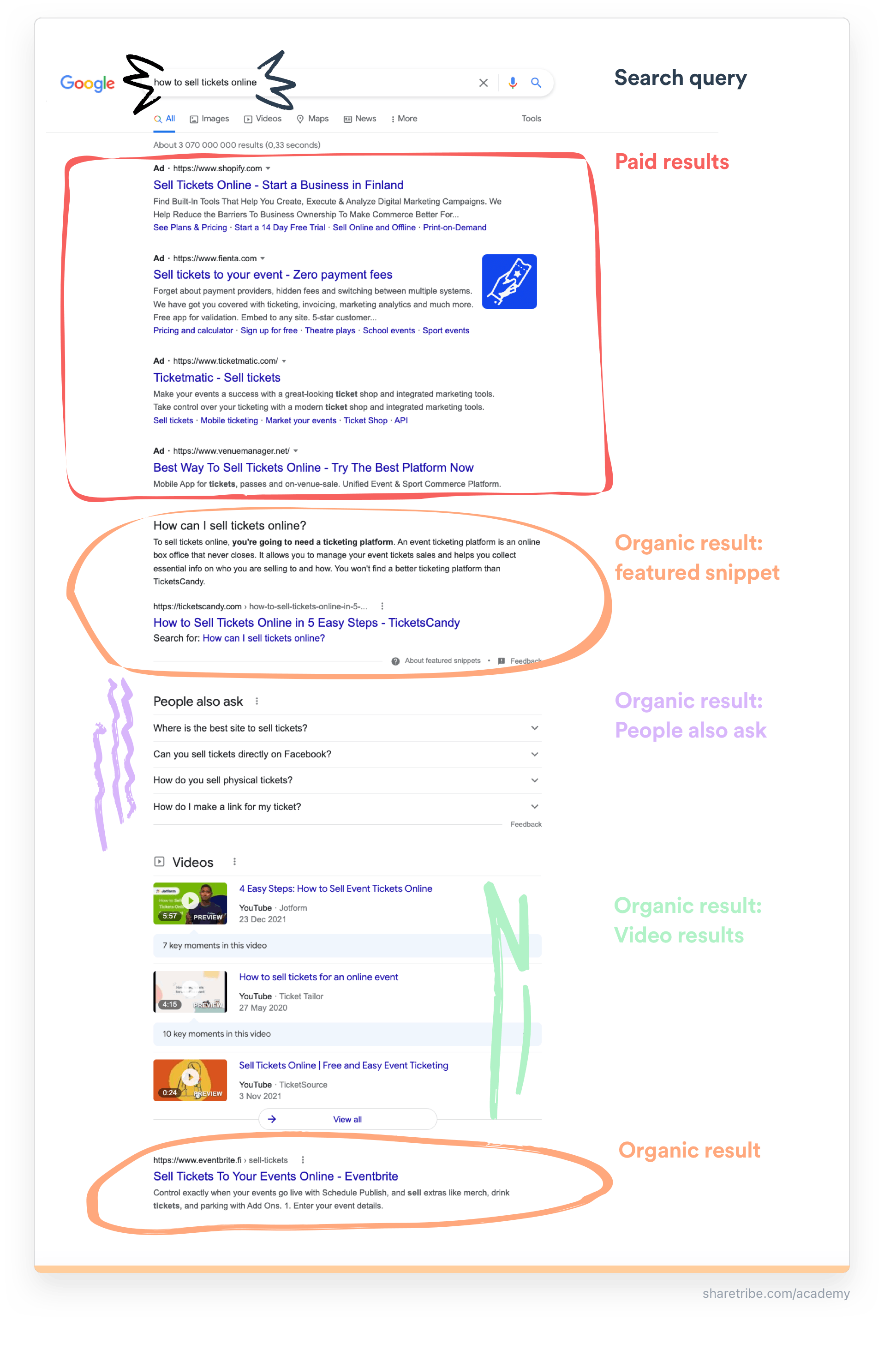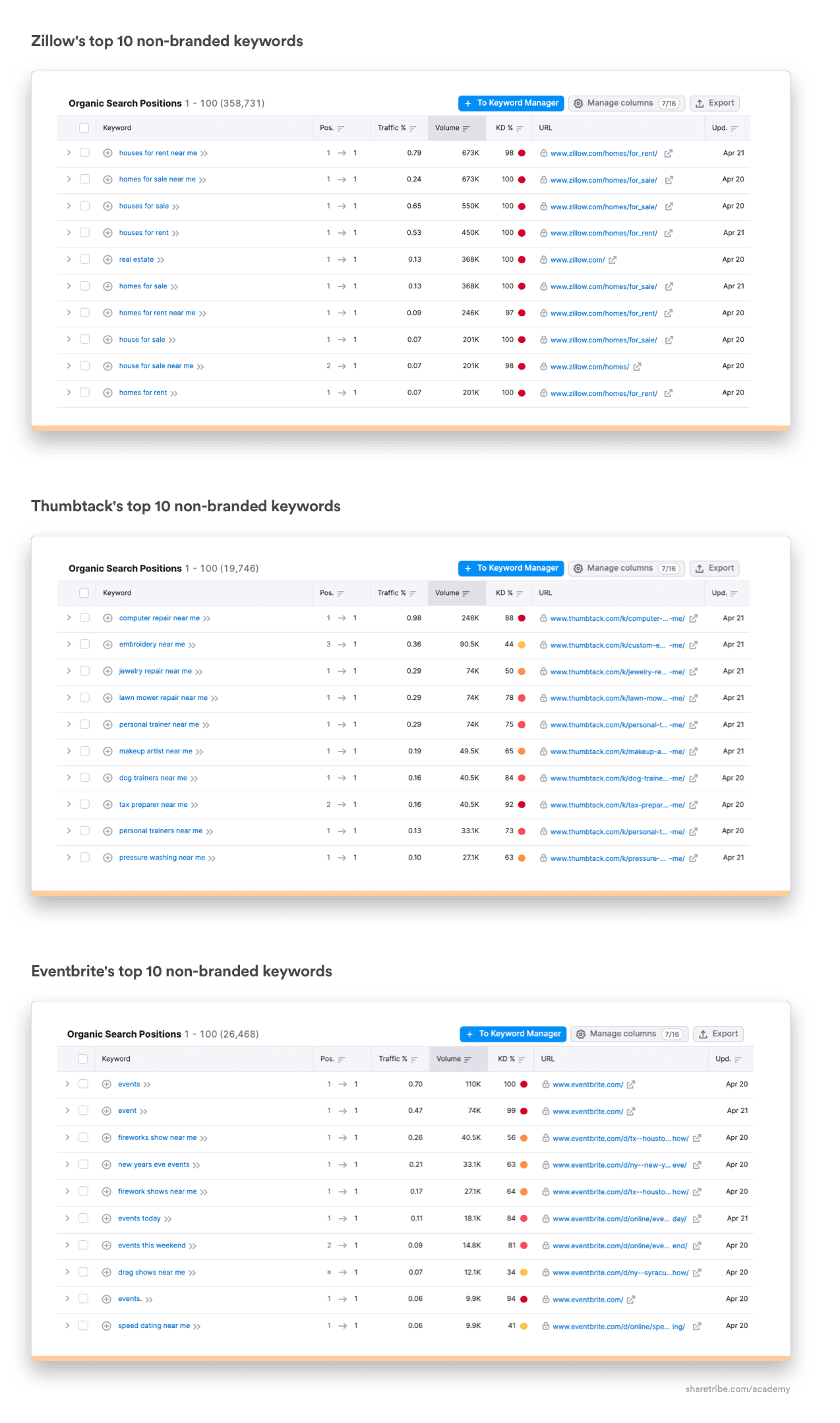Marketplace SEO: the complete guide
Welcome to the complete guide to marketplace SEO! This article series gives you a comprehensive introduction to SEO, tailored specifically to online marketplaces. This first article looks at what investing in marketplace SEO entails, how to estimate the potential return, and when is the right time to take the plunge.
Published on
Last updated on

The rules of Search Engine Optimization (SEO) are the same for everyone.
If you want to bring traffic to your business from search engines like Google, similar recommendations about site setup, keywords, content, and links apply whether your site is a marketplace, a business website, a blog, or an eCommerce store.
But marketplace websites have characteristics that set them apart from most other websites.
On the one hand, it can be hard for marketplaces to tackle technical SEO issues like site structure challenges, duplicate content, and low-quality content. On the other hand, marketplaces can benefit from their community to design a competitive keyword strategy, create engaging content, and build backlinks.
In this series of articles, I’ll give you a complete overview of SEO basics tailored to marketplace websites' unique challenges and opportunities.
I've interviewed three top experts in marketplace SEO to ensure each article is packed with practical and up-to-date advice for marketplace founders.
Mike van der Heijden is the CEO of Portal Ventures, an agency that helps marketplaces with SEO and invests in early-stage marketplaces. Michael Caldwell founded GigMasters (now The Bash) in 1997 and now runs Petworks with two decades of experience in building SEO-backed marketplace growth. Gregory Edwards is an SEO Manager at BlueArray and has worked with half a dozen of the UK’s biggest marketplace businesses to improve their SEO.
SEO is a complex field that requires constant learning and adjustment. But knowing the basics can already make a huge difference for your business. Each article will also include sources to deepen your SEO knowledge and stay updated with the latest developments.
Search Engine Optimization, or SEO, helps bring high-quality organic traffic to your marketplace through search engines like Google. (Most SEO professionals concentrate on Google because its search market share is over 90%. So does this guide.)
By marketplace SEO, I mean applying the tools and understanding of search engine optimization specifically to online marketplace websites.
Michael Caldwell says marketplace SEO should be understood as its own field of expertise entirely. This is because marketplaces have unique opportunities and unique challenges when it comes to SEO.
This section of the article gives a brief introduction to how search engines work and discusses the elements required to be able to rank for searches. If that sounds like something you already know, you can skip to chapter two to read more about estimating the SEO potential of your marketplace.
Search engines like Google exist to help searchers find what they’re looking for on the web.
Google sends bots to discover and read – ie. crawl – pages on the internet. Google collects the information the bots find and stores, analyzes, and organizes it – a process called indexing.
Google uses a variety of criteria to understand who has the best answers to which questions. Based on them, it ranks the content. The highest-ranked content is presented on the Search Results Pages (“SERPs” for short).
SEO helps you signal to Google that when someone types in a specific search query, your marketplace is the best match and should be shown higher than other results.
In other words, SEO helps you:
- ensure search engines can crawl and index your site efficiently.
- identify the searches where your marketplace can be a great match for what someone is looking for.
- understand how you can create and optimize content that ranks high on search results pages.
Ranking well is important because the search results page is a crowded place.
First, come the ads. Google lets paying customers cut the line to be featured as top results. Advertising is how Google makes money, so it has an obvious incentive to maximize paid search visibility.

To that end, Google also keeps developing its search algorithm and adding new SERP features. Its goal is to get users to spend as much time on Google as possible. Featured snippets, People Also Ask (PAA) sections, and video and image results create engaging SERPs that keep people on the search results page.
Some of these features even show an answer to the searcher’s question right away. People can find out what they want to know without clicking on a result and leaving the results page at all.
Moving up in the rankings can bring a big boost to your organic traffic.
The organic click-through rate (CTR) decreases rapidly the further down the page your marketplace is featured. Click-through rate is the number of clicks your organic result gets divided by the number of times it is shown in the SERP (reported as impressions). The first result gets clicked about 30% of the time, the third less than 20%, and only some 4% click on results 8–10.
If your SEO efforts bring your page up from result #10 to #1, you’ll be ten times more likely to receive a click. Let’s look at what it takes to achieve that.
People Also Ask sections, featured snippets, and video results give brands new opportunities to rank through different content types.
At the same time, the evolving SERPs and increased competition make SEO increasingly challenging.
In a nutshell, performing well in SEO requires:
- structuring the entire marketplace website according to technical SEO best practices.
- on-page SEO: ensuring that the technical aspects of content and keyword usage on individual pages play together to maximize your ability to rank for your chosen keywords.
- off-page-SEO: building natural, high-quality backlinks from other websites that signal to Google that your page is reliable, or in other words, has authority.
Here’s a great graph from Aleyda Solis illustrating the building blocks of ranking in a Venn diagram.
If this sounds like a lot of work, that’s because it is.
“Marketplace SEO isn’t something you can do at arm’s length,” Michael Caldwell says. “It needs to be woven into the DNA of the company.”
But as you see in Aleyda Solis’ graph, there are opportunities for focused, encompassing SEO efforts exactly because most of your competitors aren’t making the investment.
That being said, SEO may not be the right growth channel for every marketplace at every stage. So before diving into the details of each aspect of SEO, it’s important to understand if and when it offers the most substantial return on investment (ROI).
Marketers today have a vast variety of options to pick and choose their marketing mix, from social media to various forms of paid advertising, influencer marketing, and PR. Why should they invest so heavily in this one channel?
Almost 30% of all web traffic continues to come from search engines. For a single channel, that’s a considerable share.
Organic search traffic is often high quality. Because Google is so good at ranking the best content, the traffic search engines bring is usually highly targeted. Organic search results also tend to appear more reliable and authoritative to users than paid advertisements.
A further big benefit of SEO as a growth strategy is that success doesn’t hinge on the size of your marketing budget. Michael Caldwell knows this from experience: his first marketplace Gigmasters was a bootstrapped business for several years, and yet the team managed to accumulate impressive growth through SEO.
“SEO is very well suited for a bootstrapped company. It’s certainly not free; you spend hours and hours on it. But it’s something you can do without a huge marketing budget. You just need hard work, a lot of research, a lot of testing, and trial and error.”
To assess whether the hard work is worth it, ask yourself three questions:
- Is there an existing organic traffic opportunity my marketplace can leverage?
- Are there better channels for me to focus on, first?
- Is now the right time to invest in SEO?
“When you start a marketplace, the real golden nugget is: understand how people search for your product or service online. What are people typing in when they're searching for your products?”
According to Mike van der Heijden, a common problem for marketplaces is failing to understand whether or not there’s organic demand for what they’re offering.
Some marketplaces come to the market with a product with existing search demand. This is typically the case for marketplaces whose supply side consists of established businesses. People often turn to Google looking for local services, events nearby, or real estate in a specific city.
Large global players like Zillow, Eventbrite, and Thumbtack have leveraged this opportunity and used SEO as a key growth tactic. Zillow is a marketplace for real estate, Thumbtack for local professional services, and Eventbrite for events. All three platforms rank for high-volume keywords that are location or time-specific: people are looking for real estate in their city, plumbers nearby, or events today.

“Rolling out a marketplace like that means you can capitalize on that search demand a lot quicker and scale the marketplace a lot faster,” Mike says.
The situation is very different for marketplaces like Uber, Lyft, and Airbnb. When these marketplaces first started, nobody was searching for “ridesharing” because the service didn’t truly exist yet. Even today, some 90% of Uber’s organic traffic comes from branded searches. People still aren’t looking for “ride-sharing in Melbourne” – they’re looking for “Uber Melbourne” (or, likely, they’re already downloading the app and not looking for anything at all).
For the latter case, Mike’s advice is to start small and focus first on validating your product-market fit before building a big marketplace website.
“Understand whether or not search volume already exists, or whether you actually need to start by creating educational pieces around what your services are.”
SEO can be a powerful tool for building sustainable, defensible marketplace growth.
But it’s not the only tool. Like any marketplace growth strategy, what works for you depends on your marketplace type, niche, and audience.
Some marketplaces have a strong word-of-mouth or social media component that makes investing in SEO a secondary priority. Poshmark, for example, is as much a social network as it is a product marketplace. Its growth strategy has centered around user engagement and community-building since the early days.
Another typical case is if you’re building a mobile marketplace app and have a minimal web footprint. In this case, your marketing priorities might lie elsewhere.
“Although I would argue that you’re probably missing out on opportunities to acquire customers on the web that you could then drive to the app,” Michael Caldwell notes.
Some marketplaces cater to audiences that don’t habitually turn to Google for information. B2B businesses in very specialized expert fields are an example. Marketplaces like Scientist.com and Freightos tackle complex B2B transactions where quality and reliability are essential. Both marketplace parties are probably much likelier to be found through direct B2B sales and outreach than on Google.
Finally, some experts predict that the role of SEO in generating growth will deteriorate. Rand Fishkin, the founder of SparkToro, has said that “SEO in the future will be harder to invest in, harder to win at, with decreasing ROI.” That doesn’t mean there’s no point in SEO investments anymore – just that you shouldn't put all your eggs in one basket. The SparkToro blog is a great resource for marketing strategies beyond SEO.
Generally speaking, the right time to start thinking about SEO is now. Especially for the technical considerations, the earlier you start, the better.
“If you lay a good foundation for your site quality and information architecture, it can get rid of most of the legwork in the future,” Gregory Edwards says.
When it comes to driving traffic through SEO, marketplaces might want to hold off making a bigger investment until they’ve built a high-quality initial supply.
According to a study by Lenny Rachitsky, most marketplaces have leveraged SEO for their demand-side acquisition and used different approaches to build supply. This makes sense – usually, building a high-quality supply requires building relationships and selling your solution, while the demand side is likelier to google solutions to their questions.
So when is the right time to start investing in SEO? When you’ve built your initial marketplace supply and are ready to start driving customers to them. This is what Michael Caldwell did with both GigMasters and Petworks.
“We didn’t think about SEO right away. With GigMasters, we knew we first needed to just get musicians on the platform. We sent out lots of emails, we went to clubs to hand out flyers, we went to music festivals.”
Once the supply was onboard, the team started thinking about strategies to drive demand.
“When you’re bringing customers to the platform, that’s the moment when you need to start thinking about making the investment in SEO. You can get into it later, certainly. But I would highly encourage founders to keep SEO expertise in mind already when building the team.”
However, even if you’re in the stage where growing the demand is a priority, your growth objectives may mean other growth strategies that suit you better.
If you need to see substantial growth very quickly, SEO might not work for you. For all its potential, SEO is slow to provide ROI. If you don’t have six months to wait for traffic to accumulate, you might consider starting with a different growth strategy.
Marketplace SEO looks at how SEO knowledge and tools can benefit marketplaces specifically.
Many SEO tactics and strategies apply to most if not all websites. Marketplaces, however, have characteristics that make SEO more challenging. At the same time, marketplace businesses have unique opportunities that can boost their SEO efforts.
Getting started with SEO in as challenging a field as marketplaces might feel like a big undertaking. But understanding the basics can already help you drive growth for your marketplace.
Throughout this article series, my goal is to help you figure out the core SEO improvements you can make to your marketplace website. If you see an impact and want to learn more, you have a foundation on which to build deeper SEO expertise.
“In the beginning, you will not know everything, and that might seem like a bad thing or quite daunting,” Gregory Edwards says.
“But the industry is constantly evolving, and there’s a wide scope of areas that can be looked at in more and more detail granularly. If you are eager to learn and genuinely interested in the world of SEO, you will flourish.”
The rest of this article series looks more closely at:
- The specific opportunities and challenges SEO presents to marketplaces
- Technical SEO and recommendations for online marketplaces
- Keyword research and creating a keyword strategy for your marketplace
- Creating keyword-rich content for your marketplace
- Link-building strategies for marketplaces
Each article shares insightful advice from Mike van der Heijden, Michael Caldwell, and Gregory Edwards. I also refer to a bunch of articles and Twitter threads from SEO professionals you can follow to widen your SEO understanding. All articles also include some tips for SEO tools and techniques that can help you investigate your SEO performance, find keyword opportunities, write great content, and measure your SEO development.
The field of SEO is vast and constantly evolving, so diving deeper into general SEO practices is a good idea at some point. To expand on the SEO introduction I provided in this article, I recommend the following sources:
- Moz’s Beginners’ Guide to SEO is a great resource for anyone getting started with SEO.
- I’ve also found a lot of value in Ahrefs’ SEO tutorial video series and Moz’s Whiteboard Friday video series.
- SemRush writes about specific SEO challenges and techniques in an accessible way.
- Search Engine Journal is a great source for the latest SEO news.
SEO experts to follow:
- Aleyda Solis has worked with marketplaces like Eventbrite and Zillow. Her weekly #SEOFOMO newsletter shares the latest in the world of SEO and highlights SEO experts you should follow.
- Kristina Azarenko tweets especially about technical SEO and has a great educational approach in her content.
- Areej Abuali is the founder of the Women in Tech SEO community and writes about technical SEO and inclusivity in the SEO field.
- You’ll find more recommendations on experts to follow in the upcoming articles.
A list of SEO tools to consider as you start working on your SEO:
- Google Search Console helps you measure your site's Search traffic and performance and fix issues.
- Google Analytics offers a free tool to track and report website traffic. (Note, though, that there isn’t yet full certainty whether Google Analytics is compliant with EU’s GDPR.)
- Screaming Frog is an advanced SEO audit tool. The free version is already pretty useful, but a paid plan is required for a comprehensive audit.
- Ahrefs, Moz, and SEMRush are the leading SEO SaaS platforms. They’re relatively pricey, but worth investing in if SEO is your core strategy. Of the three, SEMRush has the most encompassing freemium plan. Ahrefs has a free webmaster tools product and Moz offers a 30-day free trial.
- Google’s Lighthouse is an open-source, automated tool for improving the quality of web pages. It has audits for performance, accessibility, progressive web apps, and SEO.
You might also like...

Focus your marketplace on one city and one vertical
Tackle the chicken-or-egg problem with an extreme focus.

How to find the best marketplace growth strategies
Choosing the early-stage marketing mix for your marketplace.

Online marketplace design: the 5 principles of a great marketplace UX
Five key online marketplace design principles and tons of practical tips and examples. Courtesy of marketplace UX designer Fiona Burns.
Start your 14-day free trial
Create a marketplace today!
- Launch quickly, without coding
- Extend infinitely
- Scale to any size
No credit card required

